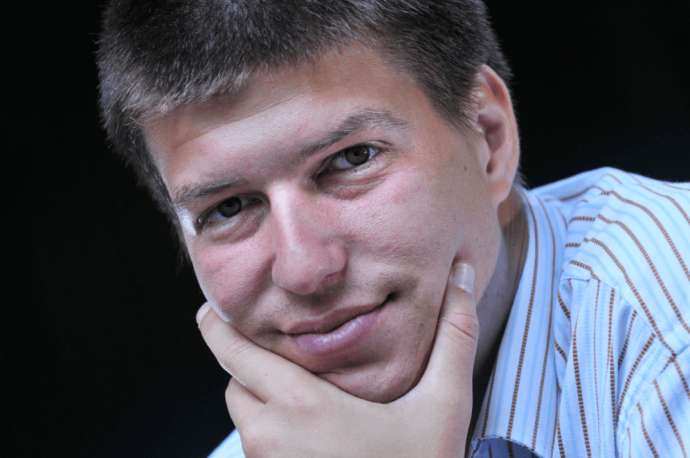Goran Vojnović came to prominence with his first novel, Čefurji raus! (2008), translated as Southern Scum Go Home!, which explores the lives of immigrants from the former Yugoslavia and those of their children in Ljubljana’s Fužine, a group commonly known as čefurji. It’s a work that essential reading for anyone interested in Slovenia and wanting to lift the lid on the chocolate box images that dominate foreign representations of the country.
He followed this up with Jugoslavija, moja dežela(2011) (Yugoslavia, My Fatherland), a work that deals more directly with the disintegration of Yugoslavia. His most recent novel is Figa (2016), which on 20 October is released in its English version by Istros Books (and translated by Olivia Hellewell) as The Fig Tree. We’ll have something more about that next weekend, but for now here’s an interview with the man himself…
How doe The Fig Tree stand in relation to your first two books?
I once said that my first two novels were two screams, while The Fig Tree is a silent exhale. It is a different, gentler novel, I think. With first two novels I addressed two things that define me most as a person. Growing up as čefur and Balkan war. I think I just had to cry it out so I can become a real writer, to be able to put literature in pole position while I am writing. The Fig Tree is dealing with topics of my first two novels – I will probably stick to them to the very end - but in a different way.
The Fig Tree is set on the coast, in Istria, is that an area that you have a personal connection with?
My mother is from Pula and I've spent a big part of my childhood there. Istria is therefore inseparable part of my homeland, my novel The Fig Tree is not just set there but is actually made from my memories of Istria and my family, it is born out of feelings Istria awakens in me. There are also many places in Slovenia where I feel at home, but it is difficult to say where I am happiest. Happiness is not about places for me. In Ljubljana I was probably happiest, but I had also my worst time there.
Our readers are interested in Slovenia, but usually can’t understand Slovenian to a high level yet. What are some of the culture products you’d suggest they pay attention to as they learn more about the country?
Slovenia is not so easy to understand and one should never underestimate its diversity and its paradoxes. It is a ridiculously small country but one with extraordinarily rich cultural influences. We lie on a great crossroad of Roman, German and Slavic world, with gorgeously rich Hungarian culture in the east. On top of that, we were on the frontier between socialist East and capitalist West for almost half a century. To be honest, I think that we are still searching for our own identity, trying to figure out who we are, so be patient with us, please.
With all that said, you should read Prišleki (1984) (Newcomers: Book Two) our greatest novel by great Lojze Kovačič, which is by far the best take on our complex contemporary history.
The novels of Andrej E. Skubic [such as Fužine Blues] and films from Damjan Kozole [Slovenka (Slovenian Girl); Rezervni deli (Spare Parts)] successfully deal with transition and its consequences, one topic that is in my opinion proved to be the most difficult to deal with.
The whole film, with subtitles and in better quality than the trailer, is on YouTube here
But if you are here for the art, then search out the books of Dušan Šarotar or Matjaž Ivanišin's films. Or poetry from Esad Babačić, Katja Perat, Anja Golob and many other great Slovenian poets. I love how late Metka Krašovec paints silence or sublime sculptures of Jakov Brdar. I love Severa Gjurin's magical voice and Pannonian melancholy of Vlado Kreslin's music. And once you master the Slovenia language you should definitely listen to Iztok Mlakar, our greatest storyteller. And yes, Špela Čadež's short animations are also a must.
I could go on or write completely different list, of course, but let's stop at that.
You're also a very well-respected screenwriter and director. To ask a question that was going around Twitter: Netflix called, offered a huge budget and gave you creative freedom for a limited series about Slovenia, set in any time – what period would you focus on?
Well, if they offered me a really huge budget I would definitely shot Lojze Kovačič's Prišleki. It would be a great TV series. And I would cast the best Slovenian actors which in my opinion are as good as any in this world.
How would you like to see Slovenia change over the next decade or two, and do you have any optimism this will happen?
I am not optimistic person but judging from your last two questions you really want me to imagine unimaginable so I could say that I would like Slovenia to calm down its own adolescent political hysteria and I would love if our professional environment would become professional indeed. I would also love if we would finally get a proper public transport so people could start using it daily when travelling between cities. I also hope that our everyday life stays as relaxed as it is and that we will continue to cherish our free time as we do now.
What are you working on now?
As always, I am working on many things. I am preparing the release of my new feature film Once Were Humans, while also working on a documentary about Eurobasket 2017. I am finishing my new novel too.
You can pre-order a copy of The Fig Tree from Istros Books, and find Vojnović's other titles in bookstores or online



